世界快疯了,将2 + 2计算器推向了云端。 为什么我们变得更糟? 让我们将Hello World推入三个微服务中,编写一些测试,为用户提供文档,绘制漂亮的组装管道,并在测试成功通过的情况下为有条件的云销售提供部署。 因此,本文将举例说明如何从规范到部署再到产品的整个产品开发过程。 有意思吗 然后我问下凯特
Roooo从哪里开始...?
没有祖国,而是产物。 是的,产品始于构想。 所以这个想法是这样的:
- 需要通过REST API返回“ Hello World”的服务
- “ Hello”一词提供了一种由command_1设计,创建和测试的微服务
- “世界”一词给出了第二个词,该词由team_2负责
- team_3编写了用于将“ Hello”和“ World”粘合在一起的集成服务
- 操作系统(台式机)-Debian 9 Stretch
- IDE-IntelliJ IDEA 2019.1
- Git Repo-GitHub
- CI-大堂5.4.0
- Maven回购-Nexus
- Openjdk 11
- Maven的3.6.0
- Kubernetes 1.14(1个主+ 1个工人):印花布网络,nginx-ingress-controller
重要说明:本文不是关于漂亮的代码(codestyle,checkstyle,javadocs,SOLID和其他流行术语)和完美解决方案(您可以无休止地谈论完美的Hello World)。 它是关于如何将代码,规范,管道组装以及产品中组装的所有东西的交付方式放在一起的,但是实际上,您可以拥有一些带有复杂的,很酷的微服务的高负载产品,而不是HelloWorld,并且可以将所描述的过程应用于该产品。
服务由什么组成?
最终产品形式的服务必须包含:
- 规范以OpenAPI标准的yaml文档的形式提供,并可以根据要求提供(GET / doc)
- 第一段中指定的API方法
- README.md带有启动和配置服务的示例
我们将按顺序分析服务。 走吧
“你好”微服务
规格书
我们在Swagger编辑器中编写规范,然后将其转换为OpenAPI规范。 Swagger编辑器是通过一个命令在docker中启动的,将swagger扩展坞转换为openapi-doc是通过在编辑器UI中按一个按钮完成的,该按钮将POST / api / convert请求发送到http://converter.swagger.io 。 hello服务的最终规范:
openapi: 3.0.1 info: title: Hello ;) description: Hello microservice version: 1.0.0 servers: - url: https://demo1.bihero.io/api/hello tags: - name: hello description: Everything about saying 'Hello' paths: /: x-vertx-event-bus: address: service.hello timeout: 1000c get: tags: - hello summary: Get 'Hello' word operationId: getHelloWord responses: 200: description: OK /doc: x-vertx-event-bus: address: service.hello timeout: 1000c get: tags: - hello_doc summary: Get 'Hello' microservice documentation operationId: getDoc responses: 200: description: OK components: {}
实作
从要编写的代码的角度来看,该服务包括3个类:
- 与服务方法的接口(方法名称在规范中指定为operationId )
- 接口实现
- vertx verticle,用于将服务与spec绑定(第一段中的api方法->接口方法)并用于启动http服务器
src中的文件结构如下所示:

pom.xml <?xml version="1.0" encoding="UTF-8"?> <project xmlns="http://maven.apache.org/POM/4.0.0" xmlns:xsi="http://www.w3.org/2001/XMLSchema-instance" xsi:schemaLocation="http://maven.apache.org/POM/4.0.0 http://maven.apache.org/xsd/maven-4.0.0.xsd"> <modelVersion>4.0.0</modelVersion> <properties> <main.verticle>io.bihero.hello.HelloVerticle</main.verticle> <vertx.version>3.8.1</vertx.version> <logback.version>1.2.3</logback.version> <junit-jupiter.version>5.3.1</junit-jupiter.version> <maven-surefire-plugin.version>2.19.1</maven-surefire-plugin.version> <junit-platform-surefire-provider.version>1.1.0</junit-platform-surefire-provider.version> <assertj-core.version>3.8.0</assertj-core.version> <allure.version>2.8.1</allure.version> <allure-maven.version>2.10.0</allure-maven.version> <aspectj.version>1.9.2</aspectj.version> <mockito.version>2.21.0</mockito.version> <rest-assured.version>3.0.0</rest-assured.version> </properties> <groupId>io.bihero</groupId> <artifactId>hello-microservice</artifactId> <version>1.0.0-SNAPSHOT</version> <build> <plugins> <plugin> <artifactId>maven-compiler-plugin</artifactId> <configuration> ```1.8</source> <target>1.8</target> </configuration> <executions> <execution> <id>default-compile</id> <configuration> <annotationProcessors> <annotationProcessor>io.vertx.codegen.CodeGenProcessor</annotationProcessor> </annotationProcessors> <generatedSourcesDirectory>src/main/generated</generatedSourcesDirectory> <compilerArgs> <arg>-Acodegen.output=${project.basedir}/src/main</arg> </compilerArgs> </configuration> </execution> <execution> <id>default-testCompile</id> <configuration> <annotationProcessors> <annotationProcessor>io.vertx.codegen.CodeGenProcessor</annotationProcessor> </annotationProcessors> <generatedTestSourcesDirectory>src/test/generated</generatedTestSourcesDirectory> <compilerArgs> <arg>-Acodegen.output=${project.basedir}/src/test</arg> </compilerArgs> </configuration> </execution> </executions> </plugin> <plugin> <groupId>org.apache.maven.plugins</groupId> <artifactId>maven-surefire-plugin</artifactId> <version>${maven-surefire-plugin.version}</version> <configuration> <properties> <property> <name>listener</name> <value>io.qameta.allure.junit5.AllureJunit5</value> </property> </properties> <includes> <include>**/*Test*.java</include> </includes> <argLine> -javaagent:"${settings.localRepository}/org/aspectj/aspectjweaver/${aspectj.version}/aspectjweaver-${aspectj.version}.jar" -Djdk.net.URLClassPath.disableClassPathURLCheck=true </argLine> <systemProperties> <property> <name>allure.results.directory</name> <value>${project.basedir}/target/allure-results</value> </property> <property> <name>junit.jupiter.extensions.autodetection.enabled</name> <value>true</value> </property> </systemProperties> <reportFormat>plain</reportFormat> </configuration> <dependencies> <dependency> <groupId>org.aspectj</groupId> <artifactId>aspectjweaver</artifactId> <version>${aspectj.version}</version> </dependency> <dependency> <groupId>org.junit.platform</groupId> <artifactId>junit-platform-surefire-provider</artifactId> <version>${junit-platform-surefire-provider.version}</version> </dependency> <dependency> <groupId>org.junit.jupiter</groupId> <artifactId>junit-jupiter-engine</artifactId> <version>${junit-jupiter.version}</version> </dependency> </dependencies> </plugin> <plugin> <groupId>io.qameta.allure</groupId> <artifactId>allure-maven</artifactId> <version>${allure-maven.version}</version> </plugin> <plugin> <groupId>org.apache.maven.plugins</groupId> <artifactId>maven-site-plugin</artifactId> <version>3.7.1</version> <dependencies> <dependency> <groupId>org.apache.maven.wagon</groupId> <artifactId>wagon-webdav-jackrabbit</artifactId> <version>2.8</version> </dependency> </dependencies> </plugin> <plugin> <groupId>org.apache.maven.plugins</groupId> <artifactId>maven-project-info-reports-plugin</artifactId> <version>3.0.0</version> </plugin> <plugin> <groupId>org.apache.maven.plugins</groupId> <artifactId>maven-shade-plugin</artifactId> <version>2.3</version> <executions> <execution> <phase>package</phase> <goals> <goal>shade</goal> </goals> <configuration> <transformers> <transformer implementation="org.apache.maven.plugins.shade.resource.ManifestResourceTransformer"> <manifestEntries> <Main-Class>io.vertx.core.Launcher</Main-Class> <Main-Verticle>${main.verticle}</Main-Verticle> </manifestEntries> </transformer> <transformer implementation="org.apache.maven.plugins.shade.resource.AppendingTransformer"> <resource>META-INF/services/io.vertx.core.spi.VerticleFactory</resource> </transformer> </transformers> <artifactSet> </artifactSet> <outputFile>${project.build.directory}/${project.artifactId}-fat.jar</outputFile> </configuration> </execution> </executions> </plugin> </plugins> <resources> <resource> <directory>src/main/resources</directory> <filtering>true</filtering> <includes> <include>**/version.txt</include> </includes> </resource> <resource> <directory>src/main/resources</directory> <filtering>false</filtering> <excludes> <exclude>**/version.txt</exclude> </excludes> </resource> </resources> </build> <distributionManagement> <site> <id>reports</id> <url>dav:https://nexus.dev.techedge.pro:8443/repository/reports/${project.artifactId}/</url> </site> </distributionManagement> <reporting> <excludeDefaults>true</excludeDefaults> <plugins> <plugin> <groupId>io.qameta.allure</groupId> <artifactId>allure-maven</artifactId> <configuration> <resultsDirectory>${project.build.directory}/allure-results</resultsDirectory> <reportDirectory>${project.reporting.outputDirectory}/${project.version}/allure</reportDirectory> </configuration> </plugin> </plugins> </reporting> <dependencies> <dependency> <groupId>io.vertx</groupId> <artifactId>vertx-web-api-service</artifactId> <version>${vertx.version}</version> </dependency> <dependency> <groupId>io.vertx</groupId> <artifactId>vertx-codegen</artifactId> <version>${vertx.version}</version> <scope>provided</scope> </dependency> <dependency> <groupId>ch.qos.logback</groupId> <artifactId>logback-classic</artifactId> <version>${logback.version}</version> </dependency> <dependency> <groupId>io.vertx</groupId> <artifactId>vertx-unit</artifactId> <version>${vertx.version}</version> <scope>test</scope> </dependency> <dependency> <groupId>io.vertx</groupId> <artifactId>vertx-junit5</artifactId> <version>${vertx.version}</version> <scope>test</scope> </dependency> <dependency> <groupId>org.junit.jupiter</groupId> <artifactId>junit-jupiter-api</artifactId> <version>${junit-jupiter.version}</version> <scope>test</scope> </dependency> <dependency> <groupId>org.junit.jupiter</groupId> <artifactId>junit-jupiter-engine</artifactId> <version>${junit-jupiter.version}</version> <scope>test</scope> </dependency> <dependency> <groupId>org.assertj</groupId> <artifactId>assertj-core</artifactId> <version>${assertj-core.version}</version> <scope>test</scope> </dependency> <dependency> <groupId>org.mockito</groupId> <artifactId>mockito-core</artifactId> <version>${mockito.version}</version> <scope>test</scope> </dependency> <dependency> <groupId>io.qameta.allure</groupId> <artifactId>allure-junit5</artifactId> <version>${allure.version}</version> <scope>test</scope> </dependency> <dependency> <groupId>io.vertx</groupId> <artifactId>vertx-web-client</artifactId> <version>${vertx.version}</version> <scope>test</scope> </dependency> </dependencies> </project>
HelloService.java package io.bihero.hello; import io.vertx.core.AsyncResult; import io.vertx.core.Handler; import io.vertx.core.Vertx; import io.vertx.ext.web.api.OperationRequest; import io.vertx.ext.web.api.OperationResponse; import io.vertx.ext.web.api.generator.WebApiServiceGen; @WebApiServiceGen public interface HelloService { static HelloService create(Vertx vertx) { return new DefaultHelloService(vertx); } void getHelloWord(OperationRequest context, Handler<AsyncResult<OperationResponse>> resultHandler); void getDoc(OperationRequest context, Handler<AsyncResult<OperationResponse>> resultHandler); }
DefaultHelloService.java package io.bihero.hello; import io.vertx.core.AsyncResult; import io.vertx.core.Future; import io.vertx.core.Handler; import io.vertx.core.Vertx; import io.vertx.core.buffer.Buffer; import io.vertx.ext.web.api.OperationRequest; import io.vertx.ext.web.api.OperationResponse; public class DefaultHelloService implements HelloService { private final Vertx vertx; public DefaultHelloService(Vertx vertx) { this.vertx = vertx; } @Override public void getHelloWord(OperationRequest context, Handler<AsyncResult<OperationResponse>> resultHandler) { resultHandler.handle(Future.succeededFuture(OperationResponse.completedWithPlainText(Buffer.buffer("Hello")))); } @Override public void getDoc(OperationRequest context, Handler<AsyncResult<OperationResponse>> resultHandler) { vertx.fileSystem().readFile("doc.yaml", buffResult -> resultHandler.handle(Future.succeededFuture( OperationResponse.completedWithPlainText(buffResult.result())) )); } }
HelloVerticle.java package io.bihero.hello; import io.vertx.core.AbstractVerticle; import io.vertx.core.Promise; import io.vertx.core.eventbus.MessageConsumer; import io.vertx.core.http.HttpServer; import io.vertx.core.http.HttpServerOptions; import io.vertx.core.json.JsonObject; import io.vertx.ext.web.Router; import io.vertx.ext.web.api.contract.openapi3.OpenAPI3RouterFactory; import io.vertx.serviceproxy.ServiceBinder; public class HelloVerticle extends AbstractVerticle { private HttpServer server; private MessageConsumer<JsonObject> consumer; @Override public void start(Promise<Void> promise) { startHelloService(); startHttpServer().future().setHandler(promise); } @Override public void stop(){ this.server.close(); consumer.unregister(); } private void startHelloService() { consumer = new ServiceBinder(vertx).setAddress("service.hello") .register(HelloService.class, HelloService.create(getVertx())); } private Promise<Void> startHttpServer() { Promise<Void> promise = Promise.promise(); OpenAPI3RouterFactory.create(this.vertx, "/doc.yaml", openAPI3RouterFactoryAsyncResult -> { if (openAPI3RouterFactoryAsyncResult.succeeded()) { OpenAPI3RouterFactory routerFactory = openAPI3RouterFactoryAsyncResult.result();
服务的接口及其实现没有什么异常(除了@WebApiServiceGen批注,但您可以在文档中阅读),但是这里更详细地介绍了verticle类代码。
在垂直开始时调用的两个方法很有趣:
- startHelloService使用我们的服务实现创建一个对象,并将其绑定到事件总线中的地址(从上面的规范中调用参数x-vertx-event-bus.address )
- startHttpServer根据服务规范创建一个路由器工厂,创建一个http服务器,并将创建的路由器挂接到所有传入的http请求的句柄(如果是gurbo,则GET /请求将进入地址为service.hello的顶点事件总线中(我们绑定在那里io.bihero.hello.HelloService服务的实现),并且服务方法名为getHelloWord )
现在是时候收集dzharnik并尝试运行:
mvn clean package
启动行中有两个有趣的参数:
- -Dlogback.configurationFile =。/ Src / conf / logback-console.xml-用于logback的配置文件的路径(项目依赖项应具有slf4j和logback作为slf4j-api的实现)
- -conf ./src/conf/config.json-服务配置,将打开HTTP REST API的端口对我们很重要:
{ "type": "file", "format": "json", "scanPeriod": 5000, "config": { "path": "/home/slava/JavaProjects/hello-world-to-cloud/hellomicroservice/src/conf/config.json" }, "serverPort": 8081, "serverHost": "0.0.0.0" }
Maven的输出对我们来说并不是特别有趣,但是您可以看到服务的启动方式(在io.netty包的记录器的设置中,设置为level =“ INFO” )
如何开始服务 2019-10-03 20:52:45,159 [vert.x-worker-thread-0] DEBUG isvpOpenAPIV3Parser: Loaded raw data: openapi: 3.0.1 info: title: Hello ;) description: Hello microservice version: 1.0.0 servers: - url: https://demo1.bihero.io/api/hello tags: - name: hello description: Everything about saying 'Hello' paths: /: x-vertx-event-bus: address: service.hello timeout: 1000c get: tags: - hello summary: Get 'Hello' word operationId: getHelloWord responses: 200: description: OK /doc: x-vertx-event-bus: address: service.hello timeout: 1000c get: tags: - hello_doc summary: Get 'Hello' microservice documentation operationId: getDoc responses: 200: description: OK components: {} 2019-10-03 20:52:45,195 [vert.x-worker-thread-0] DEBUG isvpOpenAPIV3Parser: Parsed rootNode: {"openapi":"3.0.1","info":{"title":"Hello ;)","description":"Hello microservice","version":"1.0.0"},"servers":[{"url":"https://demo1.bihero.io/api/hello"}],"tags":[{"name":"hello","description":"Everything about saying 'Hello'"}],"paths":{"/":{"x-vertx-event-bus":{"address":"service.hello","timeout":"1000c"},"get":{"tags":["hello"],"summary":"Get 'Hello' word","operationId":"getHelloWord","responses":{"200":{"description":"OK"}}}},"/doc":{"x-vertx-event-bus":{"address":"service.hello","timeout":"1000c"},"get":{"tags":["hello_doc"],"summary":"Get 'Hello' microservice documentation","operationId":"getDoc","responses":{"200":{"description":"OK"}}}}},"components":{}} Oct 03, 2019 8:52:45 PM io.vertx.core.impl.launcher.commands.VertxIsolatedDeployer INFO: Succeeded in deploying verticle
万岁! 该服务正在运行,您可以检查:
curl http://127.0.0.1:8081/ Hello curl -v http://127.0.0.1:8081/doc openapi: 3.0.1 info: title: Hello ;) description: Hello microservice version: 1.0.0 servers: - url: https://demo1.bihero.io/api/hello tags: - name: hello description: Everything about saying 'Hello' paths: /: x-vertx-event-bus: address: service.hello timeout: 1000c get: tags: - hello summary: Get 'Hello' word operationId: getHelloWord responses: 200: description: OK /doc: x-vertx-event-bus: address: service.hello timeout: 1000c get: tags: - hello_doc summary: Get 'Hello' microservice documentation operationId: getDoc responses: 200: description: OK components: {}
服务使用与规范对应的单词Hello /来响应GET /请求,并且可以谈论它可以做什么,从而给出GET / doc请求的规范。 酷,让我们去生产!
这里出了点问题...
早些时候,我写道组装期间Maven的输出对我们来说不是很重要。 我撒谎,结论很重要而且非常重要。 我们需要Maven来运行测试,并且当测试失败时,程序集也会失败。 上面的程序集通过了,这表明测试通过了,否则没有通过。 当然,我们没有任何测试,是时候编写它们了(您可以在实施之前或之后讨论方法,何时以及如何编写测试,在实现之前或之后进行辩论,但我们会在本文开头记住一个重要说明并继续进行-我们将编写一些测试)。
第一类测试本质上是一个单元测试,它测试我们服务的两种特定方法:
HelloServiceTest.java package io.bihero.hello; import io.vertx.core.Vertx; import io.vertx.core.json.JsonObject; import io.vertx.ext.web.api.OperationRequest; import io.vertx.junit5.VertxExtension; import io.vertx.junit5.VertxTestContext; import org.apache.commons.io.IOUtils; import org.junit.jupiter.api.DisplayName; import org.junit.jupiter.api.Test; import org.junit.jupiter.api.extension.ExtendWith; import java.io.IOException; import static org.assertj.core.api.Assertions.assertThat; @ExtendWith(VertxExtension.class) public class HelloServiceTest { private HelloService helloService = HelloService.create(Vertx.vertx()); @Test @DisplayName("Test 'getHelloWord' method returns 'Hello' word") public void testHelloMethod(VertxTestContext testContext) { helloService.getHelloWord(new OperationRequest(new JsonObject()), testContext.succeeding(it -> { assertThat(it.getStatusCode()).isEqualTo(200); assertThat(it.getPayload().toString()).isEqualTo("Hello"); testContext.completeNow(); })); } @Test @DisplayName("Test 'getDoc' method returns service documentation in OpenAPI format") public void testDocMethod(VertxTestContext testContext) { helloService.getDoc(new OperationRequest(new JsonObject()), testContext.succeeding(it -> { try { assertThat(it.getStatusCode()).isEqualTo(200); assertThat(it.getPayload().toString()).isEqualTo(IOUtils.toString(this.getClass() .getResourceAsStream("../../../doc.yaml"), "UTF-8")); testContext.completeNow(); } catch (IOException e) { testContext.failNow(e); } })); } }
第二个测试是非集成测试,检查垂直上升并以预期的状态和文本响应相应的http请求:
HelloVerticleTest.java package io.bihero.hello; import io.vertx.core.Vertx; import io.vertx.core.json.JsonObject; import io.vertx.ext.web.client.WebClient; import io.vertx.ext.web.codec.BodyCodec; import io.vertx.junit5.Checkpoint; import io.vertx.junit5.VertxExtension; import io.vertx.junit5.VertxTestContext; import org.apache.commons.io.IOUtils; import org.junit.jupiter.api.DisplayName; import org.junit.jupiter.api.Test; import org.junit.jupiter.api.extension.ExtendWith; import static org.assertj.core.api.Assertions.assertThat; import static org.mockito.Mockito.doReturn; import static org.mockito.Mockito.spy; @ExtendWith(VertxExtension.class) public class HelloVerticleTest { @Test @DisplayName("Test that verticle is up and respond me by 'Hello' word and doc in OpenAPI format") public void testHelloVerticle(Vertx vertx, VertxTestContext testContext) { WebClient webClient = WebClient.create(vertx); Checkpoint deploymentCheckpoint = testContext.checkpoint(); Checkpoint requestCheckpoint = testContext.checkpoint(2); HelloVerticle verticle = spy(new HelloVerticle()); JsonObject config = new JsonObject().put("serverPort", 8081).put("serverHost", "0.0.0.0"); doReturn(config).when(verticle).config(); vertx.deployVerticle(verticle, testContext.succeeding(id -> { deploymentCheckpoint.flag();
现在是时候将服务与测试一起构建:
mvn clean package
我们对surefire插件日志非常感兴趣,它看起来像这样(图片可点击):
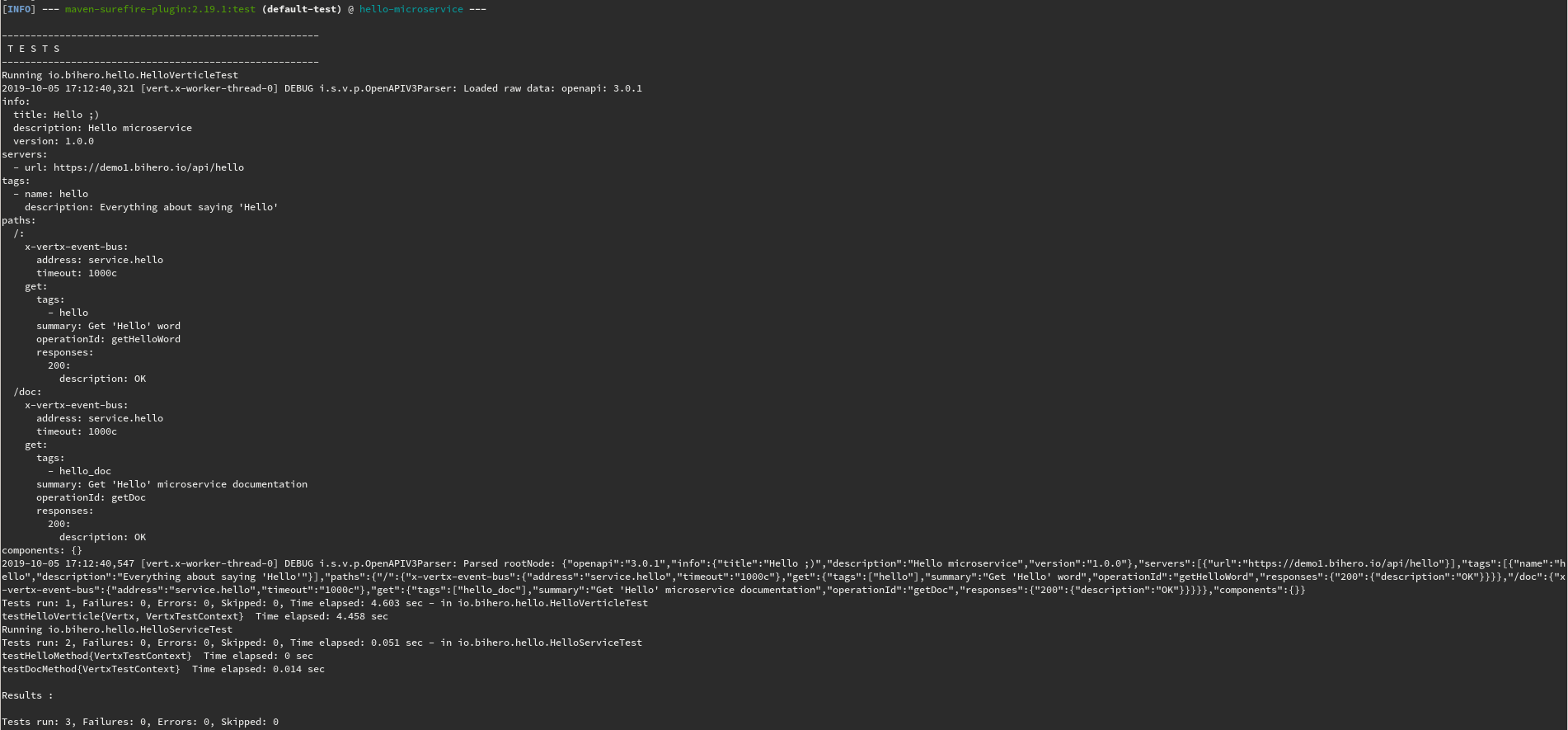
哇! 该服务已组装完毕,测试可以运行并且不会崩溃(稍后,我们将讨论如何将测试结果显示给权威机构),现在该考虑如何将其交付给用户(即服务器)了。 在院子里,2019年底,当然,我们将以Docker映像的形式捆绑应用程序。 走吧
Docker和所有
我们将基于adoptopenjdk/openjdk11为我们的第一个服务构建一个Docker映像。 将具有所有必要配置的组装好的dzharnik添加到映像中,并在docker文件中写入命令以在容器中启动应用程序。 生成的Dockerfile将如下所示:
FROM adoptopenjdk/openjdk11:alpine-jre COPY target/hello-microservice-fat.jar app.jar COPY src/conf/config.json . COPY src/conf/logback-console.xml . COPY run.sh . RUN chmod +x run.sh CMD ["./run.sh"]
run.sh脚本如下所示:
在这个阶段,我们实际上并不需要JVM_OPTS环境变量 ,但是稍后,我们将主动对其进行更改并调整虚拟机和我们的服务的参数。 现在是时候组装图像并在容器中运行应用程序了:
docker build -t="hellomicroservice" . docker run -dit --name helloms hellomicroservice
我们获取容器的ip地址,并检查容器内部服务的运行情况:
docker inspect helloms | grep IPAddress "SecondaryIPAddresses": null, "IPAddress": "172.17.0.2", "IPAddress": "172.17.0.2",
curl http://172.17.0.2:8081/
因此,服务在容器中启动。 但是我们不会在生产环境中像这样(docker run)这样的双手来运行它,因为我们有很棒的kubernetes。 要在kubernetes中运行该应用程序,我们需要一个模板,一个yml文件,其中描述了我们将运行哪些资源(部署,服务,入口等)以及基于哪个容器。 但是,在我们开始描述用于在k8s中启动应用程序的模板之前,请将先前组装的映像推送到dockerhab:
docker tag hello bihero/hello docker push bihero/hello
我们编写了一个用于在kubernetes中启动应用程序的模板(在本文的框架内,我们不是真正的焊工,也不假装是“洁净”模板):
apiVersion: extensions/v1beta1 kind: Deployment metadata: labels: io.bihero.hello.service: bihero-hello name: bihero-hello spec: replicas: 3 strategy: type: RollingUpdate rollingUpdate: maxSurge: 1 maxUnavailable: 1 template: metadata: labels: io.bihero.hello.service: bihero-hello spec: containers: - image: bihero/hello:${HELLO_SERVICE_IMAGE_VERSION} name: bihero-hello ports: - containerPort: 8081 imagePullPolicy: Always resources: {} restartPolicy: Always --- apiVersion: v1 kind: Service metadata: labels: io.bihero.hello.service: bihero-hello name: bihero-hello spec: ports: - name: "8081" port: 8081 targetPort: 8081 selector: io.bihero.hello.service: bihero-hello status: loadBalancer: {} --- apiVersion: extensions/v1beta1 kind: Ingress metadata: name: bihero-hello annotations: kubernetes.io/ingress.class: nginx nginx.ingress.kubernetes.io/ssl-redirect: "true" nginx.ingress.kubernetes.io/secure-backends: "false" nginx.ingress.kubernetes.io/ssl-passthrough: "false" nginx.ingress.kubernetes.io/rewrite-target: /$2 kubernetes.io/tls-acme: "true" namespace: default spec: tls: - hosts: - ${ID_DOMAIN} secretName: bihero rules: - host: ${ID_DOMAIN} http: paths: - path: /api/hello(/|$)(.*) backend: serviceName: bihero-hello servicePort: 8081
简要介绍一下我们在模板中看到的内容:
该模板还包括两个环境变量:
- $ {HELLO_SERVICE_IMAGE_VERSION}-带有服务的docker映像的标签,我们将从中收集我们的第一个部署
- $ {ID_DOMAIN}-我们将在其上部署服务的域
关于https的重要事项
测试集群已经有一个名为bihero的秘密,该秘密是根据LetsEncrypt的通配符证书创建的。 简而言之,团队看起来像这样
kubectl create secret tls bihero --key keys/privkey.pem --cert keys/fullchain.pem
其中privkey.pem和fullchain.pem是letencrypt生成的文件
您可以通过以下链接阅读有关在k8s中为tls创建秘密的更多信息
是时候尝试在k8s中进行部署了:)开始吧!
export HELLO_SERVICE_IMAGE_VERSION=latest export ID_DOMAIN=demo1.bihero.io cat k8s.yaml | envsubst | kubectl apply -f -
在标准输出中,您应该看到以下内容:
deployment.extensions/bihero-hello created service/bihero-hello created ingress.extensions/bihero-hello created
好吧,让我们检查一下kubernetes是否使我们到达了那里:
kubectl get po

不出所料-3炉膛
让我们来看看一个炉膛的细节
kubectl describe po bihero-hello-5b4759d55b-bf4qc
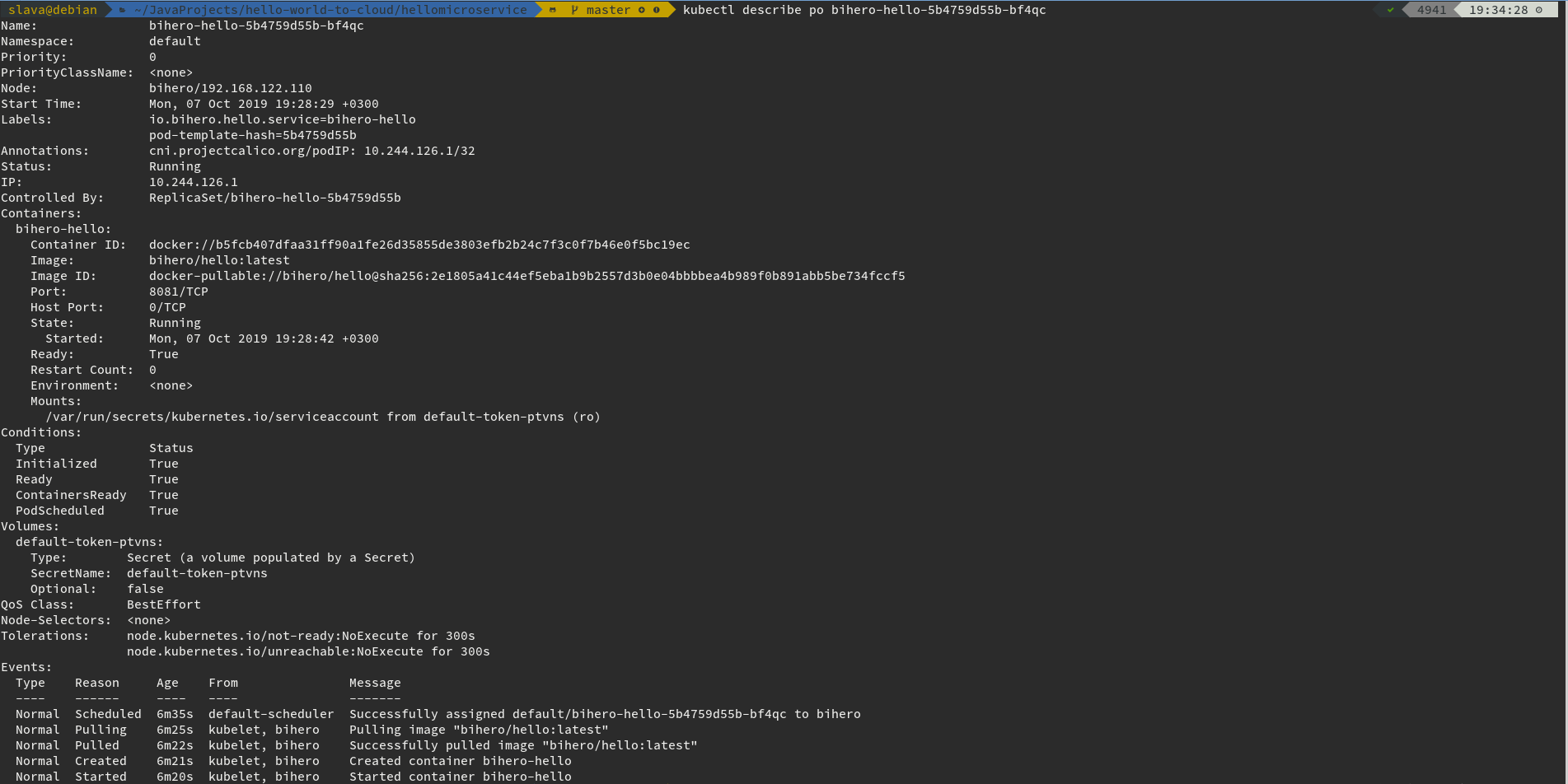
服务状况如何?
kubectl describe service bihero-hello

那入口呢?
kubectl describe ing bihero-hello

哇! 根据规范,该服务以k8s运行,并要求通过几个请求进行检查。
curl https://demo1.bihero.io/api/hello Hello
curl https://demo1.bihero.io/api/hello/doc openapi: 3.0.1 info: title: Hello ;) description: Hello microservice version: 1.0.0 servers: - url: https://demo1.bihero.io/api/hello tags: - name: hello description: Everything about saying 'Hello' paths: /: x-vertx-event-bus: address: service.hello timeout: 1000c get: tags: - hello summary: Get 'Hello' word operationId: getHelloWord responses: 200: description: OK /doc: x-vertx-event-bus: address: service.hello timeout: 1000c get: tags: - hello_doc summary: Get 'Hello' microservice documentation operationId: getDoc responses: 200: description: OK components: {}
A-自动化
ew ...我们到达了最美味和令人兴奋的地方。 在他们自己的每个阶段,完成了大量工作,并且每个步骤都伴随着手动启动一些工具。 , , k8s . , !
, , CI-.
?
- , , ( ), git-
- (mvn), (surefire, allure) — fat-jar
- docker- (docker build)
- Push docker- ( docker registry) (docker push)
- k8s (kubectl apply)
CI- ?
, ( ), . :
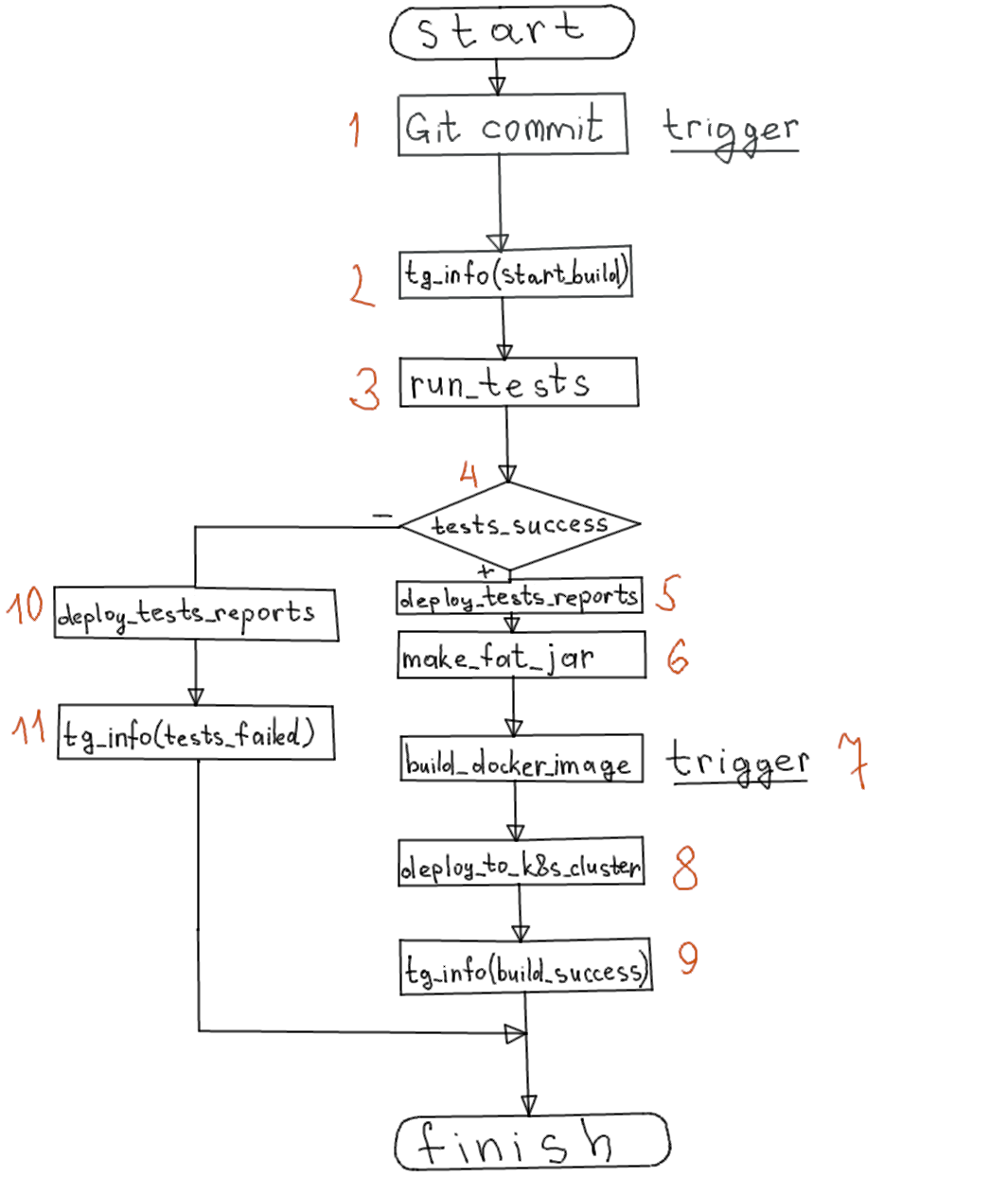
:
- , master ( master , , , merge' merge request' )
- , dev- (telegram-bot)
- ,
- — maven repository ( nexus blob store )
- fat-jar (mvn package, , — )
- docker image . , , , ( ). registry k8s
- k8s
- , k8s .
- 4- , , maven repository
- ,
Concourse CI
CI- Concourse . Concourse CI:
- UI ( yaml-, , fly ): — , (mvn, docker, fly, kubectl), , ( tg- )
- docker container', ( worker- , - environment- ) — , , .
, , :
pipeline.yaml resource_types: - name: telegram type: docker-image source: repository: vtutrinov/concourse-telegram-resource tag: latest - name: kubernetes type: docker-image source: repository: zlabjp/kubernetes-resource tag: 1.16 - name: metadata type: docker-image source: repository: olhtbr/metadata-resource tag: 2.0.1 resources: - name: metadata type: metadata - name: sources type: git source: branch: master uri: git@github.com:bihero-io/hello-microservice.git private_key: ((deployer-private-key)) - name: docker-image type: docker-image source: repository: bihero/hello username: ((docker-registry-user)) password: ((docker-registry-password)) - name: telegram type: telegram source: bot_token: ((telegram-ci-bot-token)) chat_id: ((telegram-group-to-report-build)) ci_url: ((ci_url)) command: "/build_hello_ms" - name: kubernetes-demo type: kubernetes source: server: https://178.63.194.241:6443 namespace: default kubeconfig: ((kubeconfig-demo)) jobs: - name: build-hello-microservice serial: true public: true plan: - in_parallel: - get: sources trigger: true - get: telegram trigger: true - put: metadata - put: telegram params: status: Build In Progress - task: unit-tests config: platform: linux image_resource: type: docker-image source: repository: ((docker-registry-uri))/bih/maven tag: 3-jdk-11 username: ((docker-private-registry-user)) password: ((docker-private-registry-password)) inputs: - name: sources outputs: - name: tested-workspace run: path: /bin/sh args: - -c - | output_dir=tested-workspace cp -R ./sources/* "${output_dir}/" mvn -f "${output_dir}/pom.xml" clean test caches: - path: ~/.m2/ on_failure: do: - task: tests-report config: platform: linux image_resource: type: docker-image source: repository: ((docker-registry-uri))/bih/maven tag: 3-jdk-11 username: ((docker-private-registry-user)) password: ((docker-private-registry-password)) inputs: - name: tested-workspace outputs: - name: message run: path: /bin/sh args: - -c - | output_dir=tested-workspace mvn -Dmaven.wagon.http.ssl.insecure=true -Dmaven.wagon.http.ssl.allowall=true -f "${output_dir}/pom.xml" site-deploy version=$(cat $output_dir/target/classes/version.txt) cat >message/msg <<EOL <a href="https://nexus.dev.techedge.pro:8443/repository/reports/hello-microservice/${version}/allure/">Allure report</a> EOL caches: - path: ~/.m2/ - put: telegram params: status: Build Failed (unit-tests) message_file: message/msg - task: tests-report config: platform: linux image_resource: type: docker-image source: repository: ((docker-registry-uri))/bih/maven tag: 3-jdk-11 username: ((docker-private-registry-user)) password: ((docker-private-registry-password)) inputs: - name: tested-workspace outputs: - name: message - name: tested-workspace run: path: /bin/sh args: - -c - | work_dir=tested-workspace mvn -Dmaven.wagon.http.ssl.insecure=true -Dmaven.wagon.http.ssl.allowall=true -f "${work_dir}/pom.xml" site-deploy version=$(cat $work_dir/target/classes/version.txt) cat >message/msg <<EOL <a href="https://nexus.dev.techedge.pro:8443/repository/reports/hello-microservice/${version}/allure/">Allure report</a> EOL caches: - path: ~/.m2/ - task: package config: platform: linux image_resource: type: docker-image source: repository: ((docker-registry-uri))/bih/maven tag: 3-jdk-11 username: ((docker-private-registry-user)) password: ((docker-private-registry-password)) inputs: - name: tested-workspace - name: metadata outputs: - name: app-packaged-workspace - name: metadata run: path: /bin/sh args: - -c - | output_dir=app-packaged-workspace cp -R ./tested-workspace/* "${output_dir}/" mvn -f "${output_dir}/pom.xml" package -Dmaven.main.skip -DskipTests env tag="-"$(cat metadata/build_name) echo $tag >> ${output_dir}/target/classes/version.txt cat ${output_dir}/target/classes/version.txt > metadata/version caches: - path: ~/.m2/ on_failure: do: - put: telegram params: status: Build Failed (package) - put: docker-image params: build: app-packaged-workspace tag_file: app-packaged-workspace/target/classes/version.txt tag_as_latest: true get_params: skip_download: true - task: make-k8s-app-template config: platform: linux image_resource: type: docker-image source: repository: bhgedigital/envsubst inputs: - name: sources - name: metadata outputs: - name: k8s run: path: /bin/sh args: - -c - | export DOMAIN=demo1.bihero.io export HELLO_SERVICE_IMAGE_VERSION=$(cat metadata/version) cat sources/k8s.yaml | envsubst > k8s/hello_app_template.yaml cat k8s/hello_app_template.yaml - put: kubernetes-demo params: kubectl: apply -f k8s/hello_app_template.yaml - put: telegram params: status: Build Success message_file: message/msg
:
- resource_types , , . ( , docker-, ): telegram tg- , kubernetes k8s- metadata ( , ..)
- resources , . , , docker-registry docker- , . input- ,
- jobs , . put- tg-. — get (, git-), — put — (docker image) , (metadata). task — docker- docker-image', image_resource
- ((parameter-name)) — , , , ( docker-registry).
:
fly -t bih sp -p hello-microservice -c pipeline.yaml -l credentials.yaml
credentials.yaml :
docker-registry-user: <dockerhub-user> docker-registry-password: <dockerhub-password> docker-registry-uri: <private-docker-registry-url> docker-private-registry-user: <private-docker-registry-user> docker-private-registry-password: <private-docker-registry-passwordl> telegram-ci-bot-token: <telegram-bot-token> telegram-group-to-report-build: <telegram-group-id> ci_url: <ci-server-url> deployer-private-key: | -----BEGIN OPENSSH PRIVATE KEY----- github-deploy-key -----END OPENSSH PRIVATE KEY----- kubeconfig-demo: | apiVersion: v1 clusters: - cluster: certificate-authority-data: <kube-cert-data> server: <kube-api-server-url> name: kubernetes contexts: - context: cluster: kubernetes user: kubernetes-admin name: kubernetes-admin@kubernetes current-context: kubernetes-admin@kubernetes kind: Config preferences: {} users: - name: kubernetes-admin user: client-certificate-data: <kube-client-cert-data> client-key-data: <kube-client-key-data>
. :
- CI-, :
- ( 1), c fly , CI-:
fly -t bih tj -j hello-microservice/build-hello-microservice -w
- /build_hello_ms -, telegram-group-to-report-build credentials.yaml
- master- (, , : master — , — ;) )
( ) -:
- :
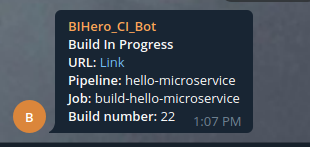
- :
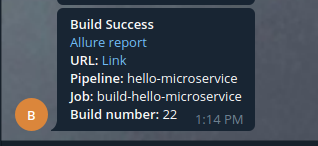
, UI CI-:
万岁! , - , , k8s . :
- docker-hub'
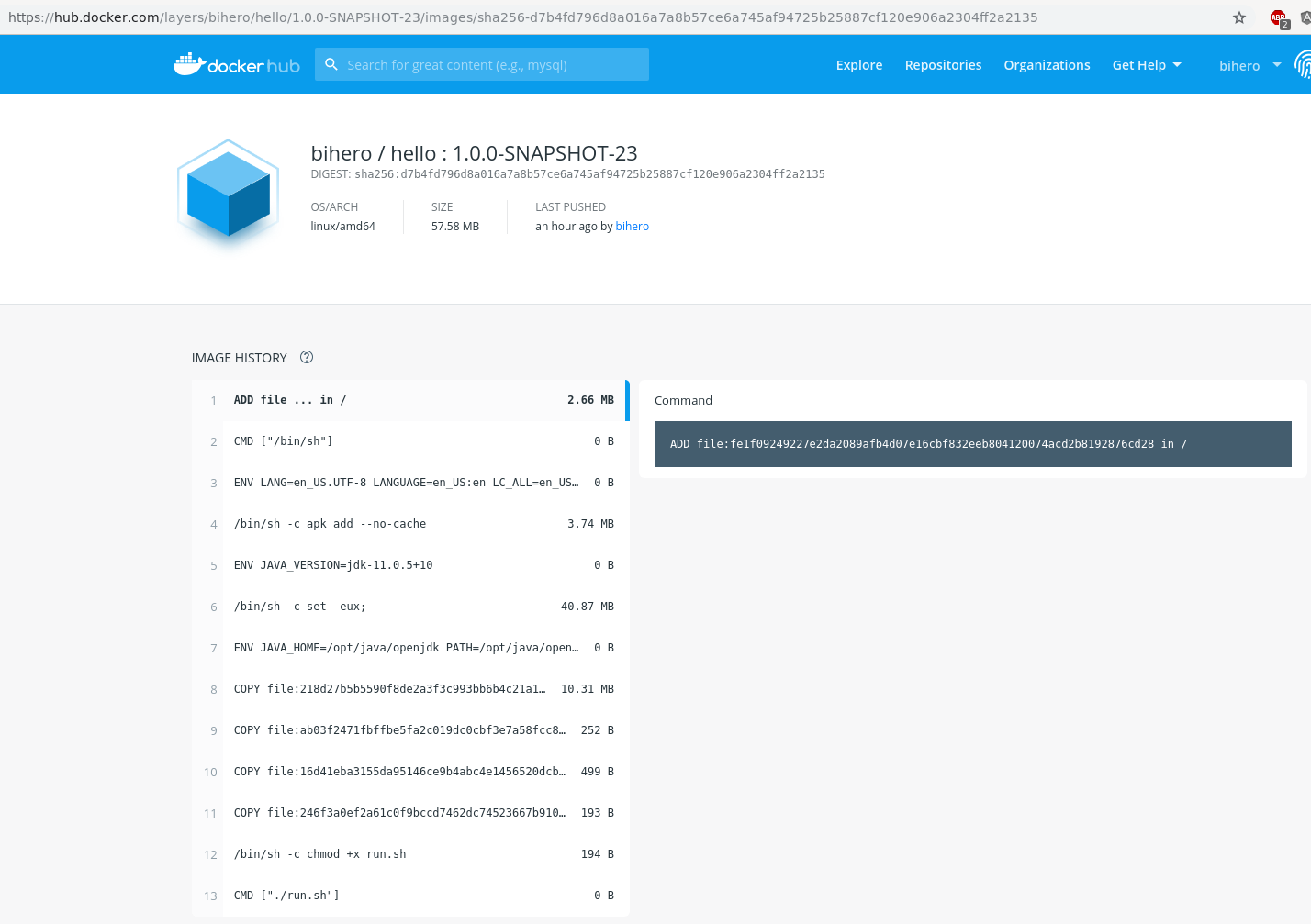

- , 2-
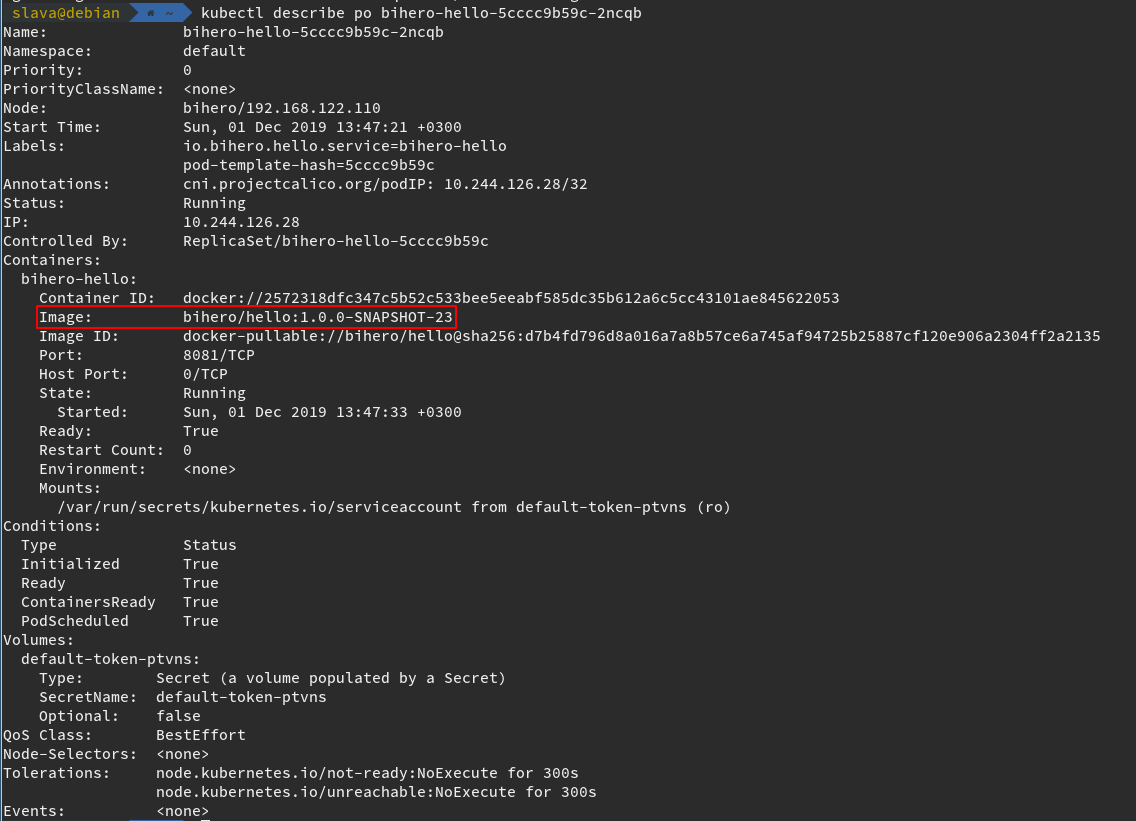
- :
curl https://demo1.bihero.io/api/hello -v curl https://demo1.bihero.io/api/hello -v 5350 14:59:04 * Trying 178.63.194.243... * TCP_NODELAY set * Connected to demo1.bihero.io (178.63.194.243) port 443 (
, , . , . , ( testcontainers). TODO- ( ). !
'World' microservice
Service specification openapi: 3.0.1 info: title: World ;) description: "'World' word microservice" version: 1.0.0 servers: - url: https://demo1.bihero.io/api/world tags: - name: world description: Everything about 'World' word paths: /: x-vertx-event-bus: address: service.world timeout: 1000 get: tags: - world summary: Get 'World' word operationId: getWorldWord responses: 200: description: OK content: {} /doc: x-vertx-event-bus: address: service.world timeout: 1000c get: tags: - world summary: Get 'World' microservice documentation operationId: getDoc responses: 200: description: OK components: {}
pom.xml <?xml version="1.0" encoding="UTF-8"?> <project xmlns="http://maven.apache.org/POM/4.0.0" xmlns:xsi="http://www.w3.org/2001/XMLSchema-instance" xsi:schemaLocation="http://maven.apache.org/POM/4.0.0 http://maven.apache.org/xsd/maven-4.0.0.xsd"> <modelVersion>4.0.0</modelVersion> <properties> <main.verticle>io.bihero.world.WorldVerticle</main.verticle> <vertx.version>3.8.1</vertx.version> <logback.version>1.2.3</logback.version> <junit-jupiter.version>5.3.1</junit-jupiter.version> <maven-surefire-plugin.version>2.19.1</maven-surefire-plugin.version> <junit-platform-surefire-provider.version>1.1.0</junit-platform-surefire-provider.version> <assertj-core.version>3.8.0</assertj-core.version> <allure.version>2.8.1</allure.version> <allure-maven.version>2.10.0</allure-maven.version> <aspectj.version>1.9.2</aspectj.version> <mockito.version>2.21.0</mockito.version> <rest-assured.version>3.0.0</rest-assured.version> </properties> <groupId>io.bihero</groupId> <artifactId>world-microservice</artifactId> <version>1.0.0-SNAPSHOT</version> <build> <plugins> <plugin> <artifactId>maven-compiler-plugin</artifactId> <configuration> ```11</source> <target>11</target> </configuration> <executions> <execution> <id>default-compile</id> <configuration> <annotationProcessors> <annotationProcessor>io.vertx.codegen.CodeGenProcessor</annotationProcessor> </annotationProcessors> <generatedSourcesDirectory>src/main/generated</generatedSourcesDirectory> <compilerArgs> <arg>-Acodegen.output=${project.basedir}/src/main</arg> </compilerArgs> </configuration> </execution> <execution> <id>default-testCompile</id> <configuration> <annotationProcessors> <annotationProcessor>io.vertx.codegen.CodeGenProcessor</annotationProcessor> </annotationProcessors> <generatedTestSourcesDirectory>src/test/generated</generatedTestSourcesDirectory> <compilerArgs> <arg>-Acodegen.output=${project.basedir}/src/test</arg> </compilerArgs> </configuration> </execution> </executions> </plugin> <plugin> <groupId>org.apache.maven.plugins</groupId> <artifactId>maven-surefire-plugin</artifactId> <version>${maven-surefire-plugin.version}</version> <configuration> <properties> <property> <name>listener</name> <value>io.qameta.allure.junit5.AllureJunit5</value> </property> </properties> <includes> <include>**/*Test*.java</include> </includes> <argLine> -javaagent:"${settings.localRepository}/org/aspectj/aspectjweaver/${aspectj.version}/aspectjweaver-${aspectj.version}.jar" -Djdk.net.URLClassPath.disableClassPathURLCheck=true </argLine> <systemProperties> <property> <name>allure.results.directory</name> <value>${project.basedir}/target/allure-results</value> </property> <property> <name>junit.jupiter.extensions.autodetection.enabled</name> <value>true</value> </property> </systemProperties> <reportFormat>plain</reportFormat> </configuration> <dependencies> <dependency> <groupId>org.aspectj</groupId> <artifactId>aspectjweaver</artifactId> <version>${aspectj.version}</version> </dependency> <dependency> <groupId>org.junit.platform</groupId> <artifactId>junit-platform-surefire-provider</artifactId> <version>${junit-platform-surefire-provider.version}</version> </dependency> <dependency> <groupId>org.junit.jupiter</groupId> <artifactId>junit-jupiter-engine</artifactId> <version>${junit-jupiter.version}</version> </dependency> </dependencies> </plugin> <plugin> <groupId>io.qameta.allure</groupId> <artifactId>allure-maven</artifactId> <version>${allure-maven.version}</version> </plugin> <plugin> <groupId>org.apache.maven.plugins</groupId> <artifactId>maven-site-plugin</artifactId> <version>3.7.1</version> <dependencies> <dependency> <groupId>org.apache.maven.wagon</groupId> <artifactId>wagon-webdav-jackrabbit</artifactId> <version>2.8</version> </dependency> </dependencies> </plugin> <plugin> <groupId>org.apache.maven.plugins</groupId> <artifactId>maven-project-info-reports-plugin</artifactId> <version>3.0.0</version> </plugin> <plugin> <groupId>org.apache.maven.plugins</groupId> <artifactId>maven-shade-plugin</artifactId> <version>2.3</version> <executions> <execution> <phase>package</phase> <goals> <goal>shade</goal> </goals> <configuration> <transformers> <transformer implementation="org.apache.maven.plugins.shade.resource.ManifestResourceTransformer"> <manifestEntries> <Main-Class>io.vertx.core.Launcher</Main-Class> <Main-Verticle>${main.verticle}</Main-Verticle> </manifestEntries> </transformer> <transformer implementation="org.apache.maven.plugins.shade.resource.AppendingTransformer"> <resource>META-INF/services/io.vertx.core.spi.VerticleFactory</resource> </transformer> </transformers> <artifactSet> </artifactSet> <outputFile>${project.build.directory}/${project.artifactId}-fat.jar</outputFile> </configuration> </execution> </executions> </plugin> </plugins> <resources> <resource> <directory>src/main/resources</directory> <filtering>true</filtering> <includes> <include>**/version.txt</include> </includes> </resource> <resource> <directory>src/main/resources</directory> <filtering>false</filtering> <excludes> <exclude>**/version.txt</exclude> </excludes> </resource> </resources> </build> <distributionManagement> <site> <id>reports</id> <url>dav:https://nexus.dev.techedge.pro:8443/repository/reports/${project.artifactId}/</url> </site> </distributionManagement> <reporting> <excludeDefaults>true</excludeDefaults> <plugins> <plugin> <groupId>io.qameta.allure</groupId> <artifactId>allure-maven</artifactId> <configuration> <resultsDirectory>${project.build.directory}/allure-results</resultsDirectory> <reportDirectory>${project.reporting.outputDirectory}/${project.version}/allure</reportDirectory> </configuration> </plugin> </plugins> </reporting> <dependencies> <dependency> <groupId>io.vertx</groupId> <artifactId>vertx-web-api-service</artifactId> <version>${vertx.version}</version> </dependency> <dependency> <groupId>io.vertx</groupId> <artifactId>vertx-codegen</artifactId> <version>${vertx.version}</version> <scope>provided</scope> </dependency> <dependency> <groupId>ch.qos.logback</groupId> <artifactId>logback-classic</artifactId> <version>${logback.version}</version> </dependency> <dependency> <groupId>io.vertx</groupId> <artifactId>vertx-unit</artifactId> <version>${vertx.version}</version> <scope>test</scope> </dependency> <dependency> <groupId>io.vertx</groupId> <artifactId>vertx-junit5</artifactId> <version>${vertx.version}</version> <scope>test</scope> </dependency> <dependency> <groupId>org.junit.jupiter</groupId> <artifactId>junit-jupiter-api</artifactId> <version>${junit-jupiter.version}</version> <scope>test</scope> </dependency> <dependency> <groupId>org.junit.jupiter</groupId> <artifactId>junit-jupiter-engine</artifactId> <version>${junit-jupiter.version}</version> <scope>test</scope> </dependency> <dependency> <groupId>org.assertj</groupId> <artifactId>assertj-core</artifactId> <version>${assertj-core.version}</version> <scope>test</scope> </dependency> <dependency> <groupId>org.mockito</groupId> <artifactId>mockito-core</artifactId> <version>${mockito.version}</version> <scope>test</scope> </dependency> <dependency> <groupId>io.qameta.allure</groupId> <artifactId>allure-junit5</artifactId> <version>${allure.version}</version> <scope>test</scope> </dependency> <dependency> <groupId>io.vertx</groupId> <artifactId>vertx-web-client</artifactId> <version>${vertx.version}</version> <scope>test</scope> </dependency> </dependencies> </project>
WorldService.java package io.bihero.world; import io.vertx.core.AsyncResult; import io.vertx.core.Handler; import io.vertx.core.Vertx; import io.vertx.ext.web.api.OperationRequest; import io.vertx.ext.web.api.OperationResponse; import io.vertx.ext.web.api.generator.WebApiServiceGen; @WebApiServiceGen public interface WorldService { static WorldService create(Vertx vertx) { return new DefaultWorldService(vertx); } void getWorldWord(OperationRequest context, Handler<AsyncResult<OperationResponse>> resultHandler); void getDoc(OperationRequest context, Handler<AsyncResult<OperationResponse>> resultHandler); }
DefaultWorldService.java package io.bihero.world; import io.vertx.core.AsyncResult; import io.vertx.core.Future; import io.vertx.core.Handler; import io.vertx.core.Vertx; import io.vertx.core.buffer.Buffer; import io.vertx.ext.web.api.OperationRequest; import io.vertx.ext.web.api.OperationResponse; public class DefaultWorldService implements WorldService { private final Vertx vertx; public DefaultWorldService(Vertx vertx) { this.vertx = vertx; } public void getWorldWord(OperationRequest context, Handler<AsyncResult<OperationResponse>> resultHandler) { resultHandler.handle(Future.succeededFuture(OperationResponse.completedWithPlainText(Buffer.buffer("World")))); } @Override public void getDoc(OperationRequest context, Handler<AsyncResult<OperationResponse>> resultHandler) { vertx.fileSystem().readFile("doc.yaml", buffResult -> resultHandler.handle(Future.succeededFuture( OperationResponse.completedWithPlainText(buffResult.result())) )); } }
WorldVerticle.java package io.bihero.world; import io.vertx.core.AbstractVerticle; import io.vertx.core.Promise; import io.vertx.core.eventbus.MessageConsumer; import io.vertx.core.http.HttpServer; import io.vertx.core.http.HttpServerOptions; import io.vertx.core.json.JsonObject; import io.vertx.ext.web.Router; import io.vertx.ext.web.api.contract.openapi3.OpenAPI3RouterFactory; import io.vertx.serviceproxy.ServiceBinder; public class WorldVerticle extends AbstractVerticle { HttpServer server; MessageConsumer<JsonObject> consumer; public void startWorldService() { consumer = new ServiceBinder(vertx).setAddress("service.world") .register(WorldService.class, WorldService.create(getVertx())); } private Promise<Void> startHttpServer() { Promise<Void> promise = Promise.promise(); OpenAPI3RouterFactory.create(this.vertx, "/doc.yaml", openAPI3RouterFactoryAsyncResult -> { if (openAPI3RouterFactoryAsyncResult.succeeded()) { OpenAPI3RouterFactory routerFactory = openAPI3RouterFactoryAsyncResult.result();
WorldServiceTest.java package io.bihero.world; import io.vertx.core.Vertx; import io.vertx.core.json.JsonObject; import io.vertx.ext.web.api.OperationRequest; import io.vertx.junit5.VertxExtension; import io.vertx.junit5.VertxTestContext; import org.apache.commons.io.IOUtils; import org.junit.jupiter.api.DisplayName; import org.junit.jupiter.api.Test; import org.junit.jupiter.api.extension.ExtendWith; import java.io.IOException; import static org.assertj.core.api.Assertions.assertThat; @ExtendWith(VertxExtension.class) public class WorldServiceTest { private WorldService worldService = WorldService.create(Vertx.vertx()); @Test @DisplayName("Test 'getWorldWord' method returns 'World' word") public void testHelloMethod(VertxTestContext testContext) { worldService.getWorldWord(new OperationRequest(new JsonObject()), testContext.succeeding(it -> { assertThat(it.getStatusCode()).isEqualTo(200); assertThat(it.getPayload().toString()).isEqualTo("World"); testContext.completeNow(); })); } @Test @DisplayName("Test 'getDoc' method returns service documentation in OpenAPI format") public void testDocMethod(VertxTestContext testContext) { worldService.getDoc(new OperationRequest(new JsonObject()), testContext.succeeding(it -> { try { assertThat(it.getStatusCode()).isEqualTo(200); assertThat(it.getPayload().toString()).isEqualTo(IOUtils.toString(this.getClass() .getResourceAsStream("../../../doc.yaml"), "UTF-8")); testContext.completeNow(); } catch (IOException e) { testContext.failNow(e); } })); } }
WorldVerticleTest.java package io.bihero.world; import io.vertx.core.Vertx; import io.vertx.core.json.JsonObject; import io.vertx.ext.web.client.WebClient; import io.vertx.ext.web.codec.BodyCodec; import io.vertx.junit5.Checkpoint; import io.vertx.junit5.VertxExtension; import io.vertx.junit5.VertxTestContext; import org.apache.commons.io.IOUtils; import org.junit.jupiter.api.DisplayName; import org.junit.jupiter.api.Test; import org.junit.jupiter.api.extension.ExtendWith; import static org.assertj.core.api.Assertions.assertThat; import static org.mockito.Mockito.doReturn; import static org.mockito.Mockito.spy; @ExtendWith(VertxExtension.class) public class WorldVerticleTest { @Test @DisplayName("Test that verticle is up and respond me by 'World' word and doc in OpenAPI format") public void testHelloVerticle(Vertx vertx, VertxTestContext testContext) { WebClient webClient = WebClient.create(vertx); Checkpoint deploymentCheckpoint = testContext.checkpoint(); Checkpoint requestCheckpoint = testContext.checkpoint(2); WorldVerticle verticle = spy(new WorldVerticle()); JsonObject config = new JsonObject().put("serverPort", 8082).put("serverHost", "0.0.0.0"); doReturn(config).when(verticle).config(); vertx.deployVerticle(verticle, testContext.succeeding(id -> { deploymentCheckpoint.flag();
Dockerfile FROM adoptopenjdk/openjdk11:alpine-jre COPY target/world-microservice-fat.jar app.jar COPY src/conf/config.json . COPY src/conf/logback-console.xml . COPY run.sh . RUN chmod +x run.sh CMD ["./run.sh"]
pipeline.yaml resource_types: - name: telegram type: docker-image source: repository: vtutrinov/concourse-telegram-resource tag: latest - name: kubernetes type: docker-image source: repository: zlabjp/kubernetes-resource tag: 1.16 - name: metadata type: docker-image source: repository: olhtbr/metadata-resource tag: 2.0.1 resources: - name: metadata type: metadata - name: sources type: git source: branch: master uri: git@github.com:bihero-io/worldmicroservice.git private_key: ((deployer-private-key)) - name: docker-image type: docker-image source: repository: bihero/world username: ((docker-registry-user)) password: ((docker-registry-password)) - name: telegram type: telegram source: bot_token: ((telegram-ci-bot-token)) chat_id: ((telegram-group-to-report-build)) ci_url: ((ci_url)) command: "/build_world_ms" - name: kubernetes-demo type: kubernetes source: server: ((k8s-api-server)) namespace: default kubeconfig: ((kubeconfig-demo)) jobs: - name: build-world-microservice serial: true public: true plan: - in_parallel: - get: sources trigger: true - get: telegram trigger: true - put: metadata - put: telegram params: status: Build In Progress - task: unit-tests config: platform: linux image_resource: type: docker-image source: repository: ((docker-registry-uri))/bih/maven-dind tag: 3-jdk-11 username: ((docker-private-registry-user)) password: ((docker-private-registry-password)) inputs: - name: sources outputs: - name: tested-workspace run: path: /bin/sh args: - -c - | output_dir=tested-workspace cp -R ./sources/* "${output_dir}/" mvn -f "${output_dir}/pom.xml" clean test caches: - path: ~/.m2/ on_failure: do: - task: tests-report config: platform: linux image_resource: type: docker-image source: repository: ((docker-registry-uri))/bih/maven-dind tag: 3-jdk-11 username: ((docker-private-registry-user)) password: ((docker-private-registry-password)) inputs: - name: tested-workspace outputs: - name: message run: path: /bin/sh args: - -c - | output_dir=tested-workspace mvn -Dmaven.wagon.http.ssl.insecure=true -Dmaven.wagon.http.ssl.allowall=true -f "${output_dir}/pom.xml" site-deploy version=$(cat $output_dir/target/classes/version.txt) cat >message/msg <<EOL <a href="https://nexus.dev.techedge.pro:8443/repository/reports/hello-microservice/${version}/allure/">Allure report</a> EOL caches: - path: ~/.m2/ - put: telegram params: status: Build Failed (unit-tests) message_file: message/msg - task: tests-report config: platform: linux image_resource: type: docker-image source: repository: ((docker-registry-uri))/bih/maven-dind tag: 3-jdk-11 username: ((docker-private-registry-user)) password: ((docker-private-registry-password)) inputs: - name: tested-workspace outputs: - name: message - name: tested-workspace run: path: /bin/sh args: - -c - | work_dir=tested-workspace mvn -Dmaven.wagon.http.ssl.insecure=true -Dmaven.wagon.http.ssl.allowall=true -f "${work_dir}/pom.xml" site-deploy version=$(cat $work_dir/target/classes/version.txt) cat >message/msg <<EOL <a href="https://nexus.dev.techedge.pro:8443/repository/reports/world-microservice/${version}/allure/">Allure report</a> EOL caches: - path: ~/.m2/ - task: package config: platform: linux image_resource: type: docker-image source: repository: ((docker-registry-uri))/bih/maven-dind tag: 3-jdk-11 username: ((docker-private-registry-user)) password: ((docker-private-registry-password)) inputs: - name: tested-workspace - name: metadata outputs: - name: app-packaged-workspace - name: metadata run: path: /bin/sh args: - -c - | output_dir=app-packaged-workspace cp -R ./tested-workspace/* "${output_dir}/" mvn -f "${output_dir}/pom.xml" package -Dmaven.main.skip -DskipTests tag="-"$(cat metadata/build_name) echo $tag >> ${output_dir}/target/classes/version.txt cat ${output_dir}/target/classes/version.txt > metadata/version caches: - path: ~/.m2/ on_failure: do: - put: telegram params: status: Build Failed (package) - put: docker-image params: build: app-packaged-workspace tag_file: app-packaged-workspace/target/classes/version.txt tag_as_latest: true get_params: skip_download: true - task: make-k8s-app-template config: platform: linux image_resource: type: docker-image source: repository: bhgedigital/envsubst inputs: - name: sources - name: metadata outputs: - name: k8s run: path: /bin/sh args: - -c - | export DOMAIN=demo1.bihero.io export WORLD_SERVICE_IMAGE_VERSION=$(cat metadata/version) cat sources/k8s.yaml | envsubst > k8s/world_app_template.yaml cat k8s/world_app_template.yaml - put: kubernetes-demo params: kubectl: apply -f k8s/world_app_template.yaml - put: telegram params: status: Build Success message_file: message/msg
k8s app template apiVersion: extensions/v1beta1 kind: Deployment metadata: labels: io.bihero.hello.service: bihero-world name: bihero-world spec: replicas: 3 strategy: type: RollingUpdate rollingUpdate: maxSurge: 1 maxUnavailable: 1 template: metadata: labels: io.bihero.hello.service: bihero-world spec: containers: - image: bihero/world:${WORLD_SERVICE_IMAGE_VERSION} name: bihero-world ports: - containerPort: 8082 imagePullPolicy: Always resources: {} restartPolicy: Always --- apiVersion: v1 kind: Service metadata: labels: io.bihero.hello.service: bihero-world name: bihero-world spec: ports: - name: "8082" port: 8082 targetPort: 8082 selector: io.bihero.hello.service: bihero-world status: loadBalancer: {} --- apiVersion: extensions/v1beta1 kind: Ingress metadata: name: bihero-world annotations: kubernetes.io/ingress.class: nginx nginx.ingress.kubernetes.io/ssl-redirect: "true" nginx.ingress.kubernetes.io/secure-backends: "false" nginx.ingress.kubernetes.io/ssl-passthrough: "false" nginx.ingress.kubernetes.io/rewrite-target: /$2 kubernetes.io/tls-acme: "true" namespace: default spec: tls: - hosts: - ${DOMAIN} secretName: bihero rules: - host: ${DOMAIN} http: paths: - path: /api/world(/|$)(.*) backend: serviceName: bihero-world servicePort: 8082
'HelloWorld' microservice
, . , , . testcontainers, .
Service specification openapi: 3.0.1 info: title: Hello World ;) description: "Hello World microservice. Aggregate 'Hello World' by hellomicroservice and worldmicroservice" version: 1.0.0 servers: - url: https://demo1.bihero.io/api/helloworld tags: - name: helloworld description: Everything about 'Hello World' paths: /: x-vertx-event-bus: address: service.helloworld timeout: 1000 get: tags: - helloworld summary: Aggregate 'Hello World' operationId: getHelloWorld responses: 200: description: OK content: {} /doc: x-vertx-event-bus: address: service.helloworld timeout: 1000c get: tags: - world summary: Get 'Hello World' microservice documentation operationId: getDoc responses: 200: description: OK components: {}
pom.xml <?xml version="1.0" encoding="UTF-8"?> <project xmlns="http://maven.apache.org/POM/4.0.0" xmlns:xsi="http://www.w3.org/2001/XMLSchema-instance" xsi:schemaLocation="http://maven.apache.org/POM/4.0.0 http://maven.apache.org/xsd/maven-4.0.0.xsd"> <modelVersion>4.0.0</modelVersion> <properties> <main.verticle>io.bihero.helloworld.HelloWorldVerticle</main.verticle> <vertx.version>3.8.1</vertx.version> <logback.version>1.2.3</logback.version> <junit-jupiter.version>5.3.1</junit-jupiter.version> <maven-surefire-plugin.version>2.19.1</maven-surefire-plugin.version> <junit-platform-surefire-provider.version>1.1.0</junit-platform-surefire-provider.version> <assertj-core.version>3.8.0</assertj-core.version> <allure.version>2.8.1</allure.version> <allure-maven.version>2.10.0</allure-maven.version> <aspectj.version>1.9.2</aspectj.version> <mockito.version>2.21.0</mockito.version> <rest-assured.version>3.0.0</rest-assured.version> <testcontainers.version>1.12.3</testcontainers.version> </properties> <groupId>io.bihero</groupId> <artifactId>hello-world-microservice</artifactId> <version>1.0.0-SNAPSHOT</version> <build> <plugins> <plugin> <artifactId>maven-compiler-plugin</artifactId> <configuration> ```11</source> <target>11</target> </configuration> <executions> <execution> <id>default-compile</id> <configuration> <annotationProcessors> <annotationProcessor>io.vertx.codegen.CodeGenProcessor</annotationProcessor> </annotationProcessors> <generatedSourcesDirectory>src/main/generated</generatedSourcesDirectory> <compilerArgs> <arg>-Acodegen.output=${project.basedir}/src/main</arg> </compilerArgs> </configuration> </execution> <execution> <id>default-testCompile</id> <configuration> <annotationProcessors> <annotationProcessor>io.vertx.codegen.CodeGenProcessor</annotationProcessor> </annotationProcessors> <generatedTestSourcesDirectory>src/test/generated</generatedTestSourcesDirectory> <compilerArgs> <arg>-Acodegen.output=${project.basedir}/src/test</arg> </compilerArgs> </configuration> </execution> </executions> </plugin> <plugin> <groupId>org.apache.maven.plugins</groupId> <artifactId>maven-surefire-plugin</artifactId> <version>${maven-surefire-plugin.version}</version> <configuration> <properties> <property> <name>listener</name> <value>io.qameta.allure.junit5.AllureJunit5</value> </property> </properties> <includes> <include>**/*Test.java</include> </includes> <argLine> -javaagent:"${settings.localRepository}/org/aspectj/aspectjweaver/${aspectj.version}/aspectjweaver-${aspectj.version}.jar" -Djdk.net.URLClassPath.disableClassPathURLCheck=true </argLine> <systemProperties> <property> <name>allure.results.directory</name> <value>${project.basedir}/target/allure-results</value> </property> <property> <name>junit.jupiter.extensions.autodetection.enabled</name> <value>true</value> </property> </systemProperties> <reportFormat>plain</reportFormat> </configuration> <dependencies> <dependency> <groupId>org.aspectj</groupId> <artifactId>aspectjweaver</artifactId> <version>${aspectj.version}</version> </dependency> <dependency> <groupId>org.junit.platform</groupId> <artifactId>junit-platform-surefire-provider</artifactId> <version>${junit-platform-surefire-provider.version}</version> </dependency> <dependency> <groupId>org.junit.jupiter</groupId> <artifactId>junit-jupiter-engine</artifactId> <version>${junit-jupiter.version}</version> </dependency> </dependencies> </plugin> <plugin> <groupId>io.qameta.allure</groupId> <artifactId>allure-maven</artifactId> <version>${allure-maven.version}</version> </plugin> <plugin> <groupId>org.apache.maven.plugins</groupId> <artifactId>maven-site-plugin</artifactId> <version>3.7.1</version> <dependencies> <dependency> <groupId>org.apache.maven.wagon</groupId> <artifactId>wagon-webdav-jackrabbit</artifactId> <version>2.8</version> </dependency> </dependencies> </plugin> <plugin> <groupId>org.apache.maven.plugins</groupId> <artifactId>maven-project-info-reports-plugin</artifactId> <version>3.0.0</version> </plugin> <plugin> <groupId>org.apache.maven.plugins</groupId> <artifactId>maven-shade-plugin</artifactId> <version>2.3</version> <executions> <execution> <phase>package</phase> <goals> <goal>shade</goal> </goals> <configuration> <transformers> <transformer implementation="org.apache.maven.plugins.shade.resource.ManifestResourceTransformer"> <manifestEntries> <Main-Class>io.vertx.core.Launcher</Main-Class> <Main-Verticle>${main.verticle}</Main-Verticle> </manifestEntries> </transformer> <transformer implementation="org.apache.maven.plugins.shade.resource.AppendingTransformer"> <resource>META-INF/services/io.vertx.core.spi.VerticleFactory</resource> </transformer> </transformers> <artifactSet> </artifactSet> <outputFile>${project.build.directory}/${project.artifactId}-fat.jar</outputFile> </configuration> </execution> </executions> </plugin> </plugins> <resources> <resource> <directory>src/main/resources</directory> <filtering>true</filtering> <includes> <include>**/version.txt</include> </includes> </resource> <resource> <directory>src/main/resources</directory> <filtering>false</filtering> <excludes> <exclude>**/version.txt</exclude> </excludes> </resource> </resources> </build> <distributionManagement> <site> <id>reports</id> <url>dav:https://nexus.dev.techedge.pro:8443/repository/reports/${project.artifactId}/</url> </site> </distributionManagement> <reporting> <excludeDefaults>true</excludeDefaults> <plugins> <plugin> <groupId>io.qameta.allure</groupId> <artifactId>allure-maven</artifactId> <configuration> <resultsDirectory>${project.build.directory}/allure-results</resultsDirectory> <reportDirectory>${project.reporting.outputDirectory}/${project.version}/allure</reportDirectory> </configuration> </plugin> </plugins> </reporting> <dependencies> <dependency> <groupId>io.vertx</groupId> <artifactId>vertx-web-api-service</artifactId> <version>${vertx.version}</version> </dependency> <dependency> <groupId>io.vertx</groupId> <artifactId>vertx-web-client</artifactId> <version>${vertx.version}</version> </dependency> <dependency> <groupId>io.vertx</groupId> <artifactId>vertx-codegen</artifactId> <version>${vertx.version}</version> <scope>provided</scope> </dependency> <dependency> <groupId>ch.qos.logback</groupId> <artifactId>logback-classic</artifactId> <version>${logback.version}</version> </dependency> <dependency> <groupId>io.vertx</groupId> <artifactId>vertx-unit</artifactId> <version>${vertx.version}</version> <scope>test</scope> </dependency> <dependency> <groupId>io.vertx</groupId> <artifactId>vertx-junit5</artifactId> <version>${vertx.version}</version> <scope>test</scope> </dependency> <dependency> <groupId>org.junit.jupiter</groupId> <artifactId>junit-jupiter-api</artifactId> <version>${junit-jupiter.version}</version> <scope>test</scope> </dependency> <dependency> <groupId>org.junit.jupiter</groupId> <artifactId>junit-jupiter-engine</artifactId> <version>${junit-jupiter.version}</version> <scope>test</scope> </dependency> <dependency> <groupId>org.assertj</groupId> <artifactId>assertj-core</artifactId> <version>${assertj-core.version}</version> <scope>test</scope> </dependency> <dependency> <groupId>org.mockito</groupId> <artifactId>mockito-core</artifactId> <version>${mockito.version}</version> <scope>test</scope> </dependency> <dependency> <groupId>io.qameta.allure</groupId> <artifactId>allure-junit5</artifactId> <version>${allure.version}</version> <scope>test</scope> </dependency> <dependency> <groupId>org.testcontainers</groupId> <artifactId>junit-jupiter</artifactId> <version>${testcontainers.version}</version> </dependency> </dependencies> </project>
HelloWorldService.java package io.bihero.helloworld; import io.vertx.core.AsyncResult; import io.vertx.core.Handler; import io.vertx.core.Vertx; import io.vertx.core.json.JsonObject; import io.vertx.ext.web.api.OperationRequest; import io.vertx.ext.web.api.OperationResponse; import io.vertx.ext.web.api.generator.WebApiServiceGen; @WebApiServiceGen public interface HelloWorldService { static HelloWorldService create(Vertx vertx, JsonObject config) { return new DefaultHelloWorldService(vertx, config); } void getHelloWorld(OperationRequest context, Handler<AsyncResult<OperationResponse>> resultHandler); void getDoc(OperationRequest context, Handler<AsyncResult<OperationResponse>> resultHandler); }
DefaultHelloWorldService.java package io.bihero.helloworld; import io.vertx.core.*; import io.vertx.core.buffer.Buffer; import io.vertx.core.json.JsonObject; import io.vertx.ext.web.api.OperationRequest; import io.vertx.ext.web.api.OperationResponse; import io.vertx.ext.web.client.WebClient; public class DefaultHelloWorldService implements HelloWorldService { private final Vertx vertx; private final JsonObject config; private final WebClient webClient; public DefaultHelloWorldService(Vertx vertx, JsonObject config) { this.vertx = vertx; this.config = config; this.webClient = WebClient.create(this.vertx); } @Override public void getHelloWorld(OperationRequest context, Handler<AsyncResult<OperationResponse>> resultHandler) { getHelloWord().compose(this::getHelloWorld).setHandler(v -> resultHandler.handle( Future.succeededFuture(OperationResponse.completedWithPlainText(Buffer.buffer(v.result()))) )); } @Override public void getDoc(OperationRequest context, Handler<AsyncResult<OperationResponse>> resultHandler) { vertx.fileSystem().readFile("doc.yaml", buffResult -> resultHandler.handle(Future.succeededFuture( OperationResponse.completedWithPlainText(buffResult.result())) )); } private Future<String> getHelloWord() { Future<String> future = Future.future(); webClient.get(config.getInteger("hello-service-port"), config.getString("hello-service-host"), "/").send(ar -> future.handle(Future.succeededFuture(ar.result().bodyAsString()))); return future; } private Future<String> getHelloWorld(String helloWord) { Future<String> future = Future.future(); webClient.get(config.getInteger("world-service-port"), config.getString("world-service-host"), "/").send(ar -> future.handle(Future.succeededFuture(helloWord + " " + ar.result().bodyAsString()))); return future; } }
HelloWorldVerticle.java package io.bihero.helloworld; import io.vertx.core.AbstractVerticle; import io.vertx.core.Promise; import io.vertx.core.eventbus.MessageConsumer; import io.vertx.core.http.HttpServer; import io.vertx.core.http.HttpServerOptions; import io.vertx.core.json.JsonObject; import io.vertx.ext.web.Router; import io.vertx.ext.web.api.contract.openapi3.OpenAPI3RouterFactory; import io.vertx.serviceproxy.ServiceBinder; public class HelloWorldVerticle extends AbstractVerticle { HttpServer server; MessageConsumer<JsonObject> consumer; public void startWorldService() { consumer = new ServiceBinder(vertx).setAddress("service.helloworld") .register(HelloWorldService.class, HelloWorldService.create(vertx, config())); } private Promise<Void> startHttpServer() { Promise<Void> promise = Promise.promise(); OpenAPI3RouterFactory.create(this.vertx, "/doc.yaml", openAPI3RouterFactoryAsyncResult -> { if (openAPI3RouterFactoryAsyncResult.succeeded()) { OpenAPI3RouterFactory routerFactory = openAPI3RouterFactoryAsyncResult.result();
HelloWorldServiceTest.java package io.bihero.helloworld; import io.vertx.core.DeploymentOptions; import io.vertx.core.Vertx; import io.vertx.core.json.JsonObject; import io.vertx.ext.web.client.WebClient; import io.vertx.ext.web.codec.BodyCodec; import io.vertx.junit5.Checkpoint; import io.vertx.junit5.VertxExtension; import io.vertx.junit5.VertxTestContext; import org.apache.commons.io.IOUtils; import org.junit.jupiter.api.DisplayName; import org.junit.jupiter.api.Test; import org.junit.jupiter.api.extension.ExtendWith; import org.testcontainers.containers.GenericContainer; import org.testcontainers.junit.jupiter.Container; import org.testcontainers.junit.jupiter.Testcontainers; import static org.assertj.core.api.Assertions.assertThat; import static org.mockito.Mockito.spy; @Testcontainers @ExtendWith(VertxExtension.class) public class HelloWorldServiceTest { @Container private static final GenericContainer helloServiceContainer = new GenericContainer("bihero/hello") .withExposedPorts(8081); @Container private static final GenericContainer worldServiceContainer = new GenericContainer("bihero/world") .withExposedPorts(8082); @Test @DisplayName("Test 'helloworld' microservice respond by 'Hello World' string and doc in OpenAPI format") public void testHelloWorld(Vertx vertx, VertxTestContext testContext) { WebClient webClient = WebClient.create(vertx); Checkpoint deploymentCheckpoint = testContext.checkpoint(); Checkpoint requestCheckpoint = testContext.checkpoint(2); HelloWorldVerticle verticle = spy(new HelloWorldVerticle()); JsonObject config = new JsonObject().put("serverPort", 8083) .put("serverHost", "0.0.0.0") .put("hello-service-host", helloServiceContainer.getContainerIpAddress()) .put("world-service-host", worldServiceContainer.getContainerIpAddress()) .put("hello-service-port", helloServiceContainer.getMappedPort(8081)) .put("world-service-port", worldServiceContainer.getMappedPort(8082)); DeploymentOptions deploymentOptions = new DeploymentOptions().setConfig(config); vertx.deployVerticle(verticle, deploymentOptions, testContext.succeeding(id -> { deploymentCheckpoint.flag();
Dockerfile — / , /usr/local , ConfigMap' k8s
Dockerfile FROM adoptopenjdk/openjdk11:alpine-jre COPY target/hello-world-microservice-fat.jar app.jar COPY src/conf/config.json /usr/local/config.json COPY src/conf/logback-console.xml . COPY run.sh . RUN chmod +x run.sh CMD ["./run.sh"]
, , CI . Concourse , , worker- docker-compose' ( ui- postgresql). — docker-, docker docker'. testcontainers ( hello world ). ? : ! docker', maven' 11- . , Dockerfile:
FROM alpine:3.7 ENV DOCKER_CHANNEL=stable \ DOCKER_VERSION=17.12.1-ce \ DOCKER_COMPOSE_VERSION=1.19.0 \ DOCKER_SQUASH=0.2.0 # Install Docker, Docker Compose, Docker Squash RUN apk --update --no-cache add \ bash \ curl \ device-mapper \ py-pip \ iptables \ util-linux \ ca-certificates \ maven \ openjdk11 --repository=http://dl-cdn.alpinelinux.org/alpine/edge/community \ && \ apk upgrade && \ curl -fL "https://download.docker.com/linux/static/${DOCKER_CHANNEL}/x86_64/docker-${DOCKER_VERSION}.tgz" | tar zx && \ mv /docker/* /bin/ && chmod +x /bin/docker* && \ pip install docker-compose==${DOCKER_COMPOSE_VERSION} && \ curl -fL "https://github.com/jwilder/docker-squash/releases/download/v${DOCKER_SQUASH}/docker-squash-linux-amd64-v${DOCKER_SQUASH}.tar.gz" | tar zx && \ mv /docker-squash* /bin/ && chmod +x /bin/docker-squash* && \ rm -rf /var/cache/apk/* && \ rm -rf /root/.cache COPY repository /root/.m2/repository # -, COPY settings.xml /root/.m2/settings.xml # maven' COPY entrypoint.sh /bin/entrypoint.sh # -, ENV JAVA_HOME=/usr/lib/jvm/java-11-openjdk/ ENTRYPOINT ["entrypoint.sh"]
entrypoint.sh , :
pipeline.yaml resource_types: - name: telegram type: docker-image source: repository: vtutrinov/concourse-telegram-resource tag: latest - name: kubernetes type: docker-image source: repository: zlabjp/kubernetes-resource tag: 1.16 - name: metadata type: docker-image source: repository: olhtbr/metadata-resource tag: 2.0.1 resources: - name: metadata type: metadata - name: sources type: git source: branch: master uri: git@github.com:bihero-io/helloworldmicroservice.git private_key: ((deployer-private-key)) - name: docker-image type: docker-image source: repository: bihero/helloworld username: ((docker-registry-user)) password: ((docker-registry-password)) - name: telegram type: telegram source: bot_token: ((telegram-ci-bot-token)) chat_id: ((telegram-group-to-report-build)) ci_url: ((ci_url)) command: "/build_helloworld_ms" - name: kubernetes-demo type: kubernetes source: server: ((k8s-api-server)) namespace: default kubeconfig: ((kubeconfig-demo)) jobs: - name: build-helloworld-microservice serial: true public: true plan: - in_parallel: - get: sources trigger: true - get: telegram trigger: true - put: metadata - put: telegram params: status: Build In Progress - task: tests privileged: true config: platform: linux image_resource: type: docker-image source: repository: ((docker-registry-uri))/bih/dind # , , , maven 11- tag: latest username: ((docker-private-registry-user)) password: ((docker-private-registry-password)) inputs: - name: sources outputs: - name: tested-workspace run: path: entrypoint.sh args: - bash - -ceux - | # testcontainers output_dir=tested-workspace cp -R ./sources/* "${output_dir}/" mvn -f "${output_dir}/pom.xml" clean test caches: - path: ~/.m2/ on_failure: do: - task: tests-report config: platform: linux image_resource: type: docker-image source: repository: ((docker-registry-uri))/bih/maven-dind tag: 3-jdk-11 username: ((docker-private-registry-user)) password: ((docker-private-registry-password)) inputs: - name: tested-workspace outputs: - name: message run: path: /bin/sh args: - -c - | output_dir=tested-workspace mvn -Dmaven.wagon.http.ssl.insecure=true -Dmaven.wagon.http.ssl.allowall=true -f "${output_dir}/pom.xml" site-deploy version=$(cat $output_dir/target/classes/version.txt) cat >message/msg <<EOL <a href="https://nexus.dev.techedge.pro:8443/repository/reports/hello-world-microservice/${version}/allure/">Allure report</a> EOL caches: - path: ~/.m2/ - put: telegram params: status: Build Failed (unit-tests) message_file: message/msg - task: tests-report config: platform: linux image_resource: type: docker-image source: repository: ((docker-registry-uri))/bih/maven-dind tag: 3-jdk-11 username: ((docker-private-registry-user)) password: ((docker-private-registry-password)) inputs: - name: tested-workspace outputs: - name: message - name: tested-workspace run: path: /bin/sh args: - -c - | work_dir=tested-workspace mvn -Dmaven.wagon.http.ssl.insecure=true -Dmaven.wagon.http.ssl.allowall=true -f "${work_dir}/pom.xml" site-deploy version=$(cat $work_dir/target/classes/version.txt) cat >message/msg <<EOL <a href="https://nexus.dev.techedge.pro:8443/repository/reports/hello-world-microservice/${version}/allure/">Allure report</a> EOL caches: - path: ~/.m2/ - task: package config: platform: linux image_resource: type: docker-image source: repository: ((docker-registry-uri))/bih/maven-dind tag: 3-jdk-11 username: ((docker-private-registry-user)) password: ((docker-private-registry-password)) inputs: - name: tested-workspace - name: metadata outputs: - name: app-packaged-workspace - name: metadata run: path: /bin/sh args: - -c - | output_dir=app-packaged-workspace cp -R ./tested-workspace/* "${output_dir}/" mvn -f "${output_dir}/pom.xml" package -Dmaven.main.skip -DskipTests tag="-"$(cat metadata/build_name) echo $tag >> ${output_dir}/target/classes/version.txt cat ${output_dir}/target/classes/version.txt > metadata/version caches: - path: ~/.m2/ on_failure: do: - put: telegram params: status: Build Failed (package) - put: docker-image params: build: app-packaged-workspace tag_file: app-packaged-workspace/target/classes/version.txt tag_as_latest: true get_params: skip_download: true - task: make-k8s-app-template config: platform: linux image_resource: type: docker-image source: repository: bhgedigital/envsubst inputs: - name: sources - name: metadata outputs: - name: k8s run: path: /bin/sh args: - -c - | export DOMAIN=demo1.bihero.io export HELLO_WORLD_SERVICE_IMAGE_VERSION=$(cat metadata/version) cat sources/k8s.yaml | envsubst > k8s/helloworld_app_template.yaml cat k8s/helloworld_app_template.yaml - put: kubernetes-demo params: kubectl: apply -f k8s/helloworld_app_template.yaml - put: telegram params: status: Build Success message_file: message/msg
k8s. hello world k8s-. k8s <service-name>..default.svc.cluster.local , , , API. , :
k8s apiVersion: v1 kind: ConfigMap metadata: name: hello-world-config data: config.json: | { "type": "file", "format": "json", "scanPeriod": 5000, "config": { "path": "/config.json" }, "serverPort": 8083, "serverHost": "0.0.0.0", "hello-service-host": "bihero-hello.default.svc.cluster.local", "hello-service-port": 8081, "world-service-host": "bihero-world.default.svc.cluster.local", "world-service-port": 8082 } --- apiVersion: extensions/v1beta1 kind: Deployment metadata: labels: io.bihero.hello.service: bihero-helloworld name: bihero-helloworld spec: replicas: 3 strategy: type: RollingUpdate rollingUpdate: maxSurge: 1 maxUnavailable: 1 template: metadata: labels: io.bihero.hello.service: bihero-helloworld spec: containers: - image: bihero/helloworld:${HELLO_WORLD_SERVICE_IMAGE_VERSION} name: bihero-helloworld ports: - containerPort: 8083 imagePullPolicy: Always resources: {} volumeMounts: # /usr/local ConfigMap' - mountPath: /usr/local/ name: hello-world-config restartPolicy: Always volumes: - name: hello-world-config configMap: name: hello-world-config --- apiVersion: v1 kind: Service metadata: labels: io.bihero.hello.service: bihero-helloworld name: bihero-helloworld spec: ports: - name: "8083" port: 8083 targetPort: 8083 selector: io.bihero.hello.service: bihero-helloworld status: loadBalancer: {} --- apiVersion: extensions/v1beta1 kind: Ingress metadata: name: bihero-helloworld annotations: kubernetes.io/ingress.class: nginx nginx.ingress.kubernetes.io/ssl-redirect: "true" nginx.ingress.kubernetes.io/secure-backends: "false" nginx.ingress.kubernetes.io/ssl-passthrough: "false" nginx.ingress.kubernetes.io/rewrite-target: /$2 kubernetes.io/tls-acme: "true" namespace: default spec: tls: - hosts: - ${DOMAIN} secretName: bihero rules: - host: ${DOMAIN} http: paths: - path: /api/helloworld(/|$)(.*) backend: serviceName: bihero-helloworld servicePort: 8083
, — , , , , :
curl https://demo1.bihero.io/api/helloworld Hello World
curl https://demo1.bihero.io/api/helloworld/doc openapi: 3.0.1 info: title: Hello World ;) description: "Hello World microservice. Aggregate 'Hello World' by hellomicroservice and worldmicroservice" version: 1.0.0 servers: - url: https://demo1.bihero.io/api/helloworld tags: - name: helloworld description: Everything about 'Hello World' paths: /: x-vertx-event-bus: address: service.helloworld timeout: 1000 get: tags: - helloworld summary: Aggregate 'Hello World' operationId: getHelloWorld responses: 200: description: OK content: {} /doc: x-vertx-event-bus: address: service.helloworld timeout: 1000c get: tags: - world summary: Get 'Hello World' microservice documentation operationId: getDoc responses: 200: description: OK components: {}
万岁! ! , …
TODO' (backlog)
- — parent pom .
- docker- docker-hub, — , , private registry.
- "" (maven-release-plugin? concourse semver-resource ?), , , .
- API - ( HelloWorld, , , ). - , — :)
, , , , :)
https://github.com/bihero-io/hello-microservice
https://github.com/bihero-io/worldmicroservice
https://github.com/bihero-io/helloworldmicroservice
[UPD] TODO'
- helm-, k8s , on-prem ,